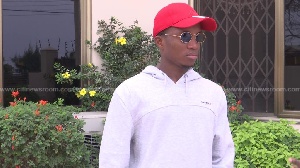- Home - News
- TWI News | TV
- Polls
- Year In Review
- News Archive
- Crime & Punishment
- Politics
- Regional
- Editorial
- Health
- Ghanaians Abroad
- Tabloid
- Africa
- Religion
- Election 2020
- Coronavirus
- News Videos | TV
- Photo Archives
- News Headlines
- Press Release
General News of Monday, 24 August 2009
Source: --
Legon Retains African Human Rights Moot Court Competition Title
Gallant University Of Ghana Retains African Human Rights Moot Court Competition Title
For the second time in succession, the Faculty of Law, University of Ghana has proven to Africa and the rest of the world that it is a major force to reckon with when it comes to mooting on the Continent. Before a capacity crowd at the Main Auditorium of the University of Lagos, Lagos, Nigeria the team partnered with Universidade Eduardo Modlane (Mozambique) and Université de Dschang (Cameroun) to give a spectacular performance which earned them the crown as winners of the 18th African Human Rights Moot Court Competition.
By that feat, the University of Ghana and Universidad Eduardo Modlane set the enviable record of becoming the first universities in the 18-year history of the competition to make a successful defence of the title, having emerged group winners in the 2008 competition held in Pretoria, South Africa. In addition, Ghana joined the elite club of 4 Faculties which have managed to win the competition three times. With its back-to-back record to boot, the University of Ghana, Faculty of Law stands out as the leading name in the prestigious African Human Rights Moot Court Competition.
The African Human Rights Moot Court Competition is an annual event which attracts Faculties of law from across Africa to moot over a case prepared around topical human rights issues confronting the continent. It is the brainchild of the Human Rights Centre, University of Pretoria, South Africa and represents the largest gathering of law students and faculty members on the continent. Every year the competition keeps growing and this year, it attracted a record number of 34 countries represented by 78 faculties of law from all the three language zones of Africa, with the Anglophones in the majority.
The competition is aimed at giving young and budding African lawyers the opportunity to hone in and develop their advocacy skills but more importantly to deepen their knowledge and understanding on the application of human rights law in the courts. It is also to offer students and faculty members alike the opportunity to network and develop professional relationships among each other.
To get to the finals, University of Ghana won all its four preliminary rounds in the Anglophone section and placed second overall behind University of Cape Town. Ghana also placed second overall in the best memorials category. These two remarkable achievements catapulted the team into the finals which it finally won. The University of Ghana was represented by Ms Adelaide Kobiri and Mr Justice Srem-Sai whose outstanding performance won the hearts of all who saw them moot. Their team coach was Dr. Kwadwo Appiagyei-Atua who has taken the team to the 2007, 2008 competitions in Dakar, Senegal and Pretoria, South Africa, respectively.
The final round of the 18th African Human Rights Moot Court Competition involved an interesting, engaging and flawless exhibition of vintage advocacy skills and sound, in-depth knowledge of the law by both sides. University of Ghana, Universidade Eduardo Modlane (Mozambique) and Université de Dschang (Cameroun) constituted the Applicant team and represented the African Commission on Human and Peoples’ Rights (bringing the action on behalf of a fictitious group called the Kongi Peoples’ Movement). The Respondents (the fictitious State of Kuramo) was represented by Faculty of Law, University of Cape Town, Faculté de droit, Université Gaston Berger (Senegal) and Universidade Zambeze (Mozambique). The Applicant’s claim covered rights to self-determination, non-discrimination on the grounds of sexual orientation, protection against unlawful detention and prohibition and punishment of the crime of genocide. The session was chaired with Justice Lawal Uwais, immediate past Chief Justice of Nigeria.
The University of Lagos was the proud organisers of the Competition. Aside a few technical difficulties and some minor organisational hiccups, the competition went on smoothly and left all participants yearning to know where the next one will be held in 2010.










